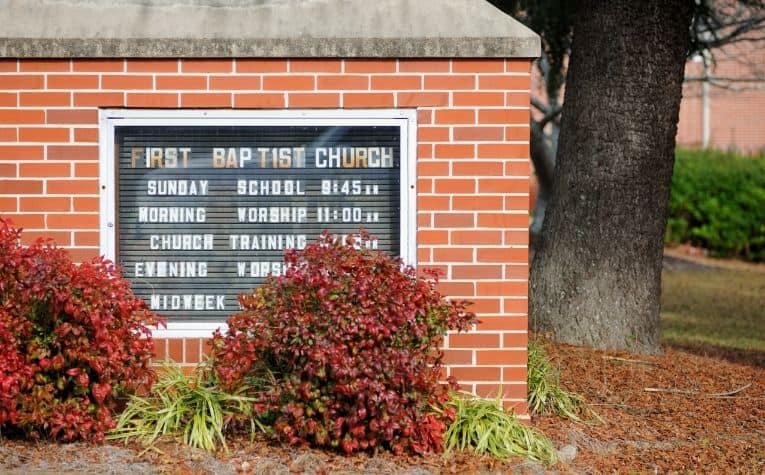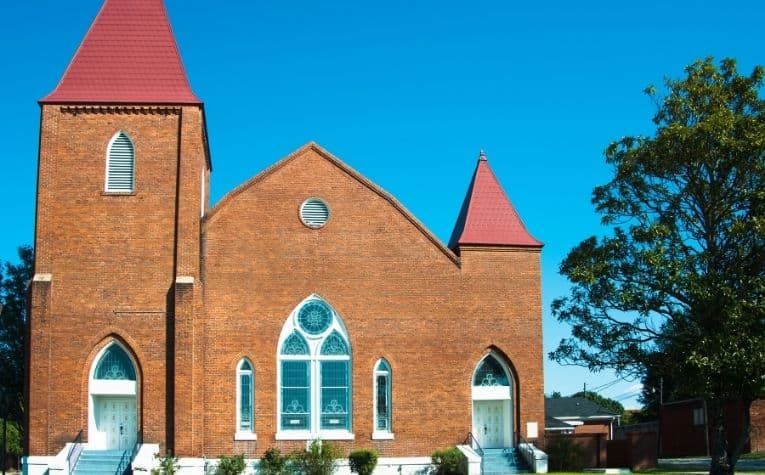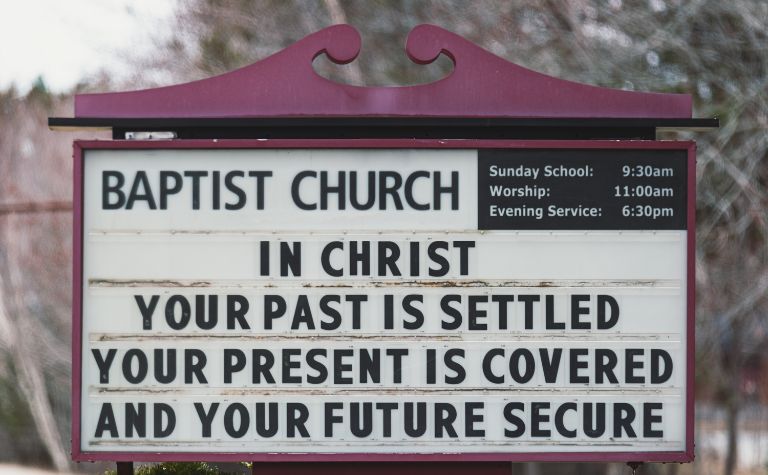Baptist churches comprise a large part of Protestant Christianity, especially in the United States. Within the Baptist tradition, there are various denominations and churches, each of which has different names. One common name is “First Baptist,” but what does it mean?
The name “First Baptist” means that a church was the first one in the Baptist tradition to be established in a certain location. First Baptist isn’t a denomination. The term simply identifies when a particular church was founded in comparison to others. Numerous Baptist denominations use the name “First Baptist.”
Why is being first so important that churches are named after it? What was the first “First Baptist” church, and when was it established? Do Baptist denominations, and others, still name their churches “first” today? Keep reading to learn more.

A “First Baptist” Church Can Be Any Baptist Denomination
Key terms | Baptist: The name “Baptist” comes from the practice of full-immersion baptism, as opposed to sprinkling. Baptists only baptize professing Christians, not infants. There isn’t one Baptist denomination, but several different ones.
The label “First Baptist” doesn’t specify any particular Baptist denomination. A “First Baptist Church” may be Southern Baptist, American Baptist, Conservative Baptist, or another kind of Baptist. Here are examples of actual churches that are named “First Baptist” from different historical traditions:
| Southern Baptist Convention |
| First Baptist Church of Dallas, Texas |
| First Baptist Church of Woodstock, Georgia |
| American Baptist Churches of the USA |
| First Baptist Church of Providence, Rhode Island |
| First Baptist Church of Boston, Massachusetts |
| Conservative Baptist Church of America |
| First Baptist Church of Minneapolis, Minnesota |
| First Baptist Church of Casa Grande, Florida |
Because Baptist congregations are independent, there is a lot of theological variety within such churches. For example,
- A Baptist church may be Calvinist or Arminian
- A Baptist church may be premillennial or Amillennial
- A Baptist church may be socially conservative or socially liberal
- A Baptist church may be historically African-American, majority Caucasian, or racially diverse
Key terms | Premillennial vs. Amillennial: Premillennialists interpret the one-thousand-year period described in Revelation 20:1-6 literally; amillennialists interpret it figuratively.
Premillennialists believe Jesus Christ will reign on Earth for 1,000 when he returns. Amillennialists believe the millennial period is the time between Christ’s first and second coming.
Because there is theological diversity in the Baptist tradition and because numerous Baptist denominations use the term “First Baptist,” it’s impossible to know a church’s convictions by just their name alone.
For example, Southern Baptist and Conservative Baptist churches are orthodox in their theology, while some American Baptist churches are progressive. (Also see What’s the Difference Between First Baptist and Second Baptist?)
Something many people wonder about Christianity is, Do All Denominations Go to Heaven?
The First Baptist Church In America
While the Baptist tradition has roots in Europe, it found fertile ground in the United States due in part to the ministry of Roger Williams (1603-1683) in 17th-century Rhode Island.
Williams, and those under his ministry, had been meeting as a church since 1637. Many people in his congregation were considered separatists and outsiders in relation to other mainline denominations.
The group originally rejected the idea of having a local church building, but eventually, the practical benefits of such a place overcame their reluctance.
In 1638 Williams and his house-church congregation founded the “First Baptist Church of Providence, Rhode Island,” which was the first Baptist church in the nation.
The label “first” didn’t reflect theological convictions or ministry principles; rather, it simply identified that it came before others. (Also see Here’s What Baptists Believe About Salvation)
Part of the reason why Baptist churches in later decades and centuries used the term “First Baptist” was because of the tradition that Williams started. (Also, see Southern Baptists vs. Baptists: What’s the Difference?)

Rivalry Within the Baptist Tradition
Like other denominations, there has always been tension and competition, and rivalry within the Baptist tradition. The Baptist tradition is one of the most diverse branches of Protestant Christianity.
Though Baptists are united on convictions like believers’ baptism, the autonomy of the local church, and the separation of Church and State, they have differences, too.
There are multiple Baptist denominations because historically like-minded Baptists have sought fellowship with one another. (Also, see This Is Why Baptists Don’t Baptize Infants)
Key term | believers baptism: In contrast to infant baptism, “believers baptism” describes the conviction that a person should be a professing Christian to be baptized. The Baptist tradition doesn’t suggest an exact age that a child can, or should be, baptized, but it is considered when the child is able, willing, and desirous to participate.
Brothers and sisters in competition? A Baptist church may want to be “first” in a particular location to demonstrate the strength of its outreach, the effectiveness of its church planting, and the success of its mission work. Some may even see establishing a new church in their tradition as a sign that God is blessing their ministry.
Like members of other denominations, some Baptists today are fiercely dedicated to their tradition, but the number of people with such zeal is less than it used to be. Nevertheless, they are living out their faith in a tradition that has experienced such attitudes. (Also see Do Baptists Believe in Predestination?)
Rivalry With Other Baptist Denominations
The current First Baptist Church in Providence, Rhode Island, opened in 1775. Unlike the original congregation, the one that oversaw the construction of the present church didn’t wrestle with the idea that a building was a sign of vanity—quite the opposite.
The church was built with features common to European-based denominations, like Anglicanism, with a steeple and a bell. In part, the features were designed to reflect that the Baptist tradition was on par with historic, mainline churches. The builders were, in part, soliciting respect. (Also, see Do Baptists Believe in Saints?)
Some may argue that respect is still a reason that some Baptist churches use and maintain the designation “First Baptist.” Some people in these congregations believe there is honor in their history and wish to continuously display God’s work within their tradition in relation to church planting and mission work.
Other Denominations Use the Term “First” Too
Baptist churches aren’t the only ones who use the “first” designation. Other Protestant denominations use the title, too, and for the same reasons: to signify that a particular church came before others. Like Baptist churches, “first” doesn’t reflect a particular theology. Examples include:
- First Methodist churches
- First Presbyterian churches
- First Lutheran churches
- First Assemblies of God church
- First Nazarene church

Do Baptist Church Plants Still Use “First” In Their Names?
Baptist church plants are sometimes given the name “first,” but it’s much less common than it used to be. When it’s done today, it’s often for different reasons than in the past. In some Baptist traditions and mission agencies, it’s customary to name a new church after the one that planted it. (Also see Can a Baptist Deacon Marry a Couple?)
For example, if a “First Baptist” church from the U.S. raised money and workers in order to plant a church in Kenya, for example, the new fellowship would be called “First Baptist” after the congregation that funded its establishment.
The trend toward generic names: The trend among Baptist churches, and those in other traditions, is to rebrand churches, removing traditional names and using generic ones.
For example, changing the name from “First Baptist Church of Anytown USA” to “Faith Family Fellowship” or “Dayspring Life Church” is more common now, as studies have shown that traditional denominations have the perception of being less inviting to non-members.
Is It Good for Baptists To Use the Name “First”?
For many people, the answer to this question depends on the spirit of the congregation. If the title reflects a prideful spirit of competition against other churches in the same tradition or Christian churches in another tradition, that attitude is contrary to the unity Christians should have (John 17:20-23). (Also see Can a Baptist Deacon Marry a Couple?)
To other people, the name may reflect their memory of God’s faithfulness to grow the Church and to call people to make disciples to the ends of the Earth (Matthew 28:18-20).
The answer to the question of whether the name is good or not may not be in the world “first,” but in the motives of those who named the church.
References:
[1] Source
[2] Source
[3] Source
Related Questions
The Baptist tradition, like other branches of the Christian faith, has a variety of expressions. The different names of denominations and churches within the tradition reflect this. Understanding...
Baptist denominations and churches, which date to the 17th century, comprise one of the largest branches of Christianity in the Western world. While Christian churches in Baptist networks and...
